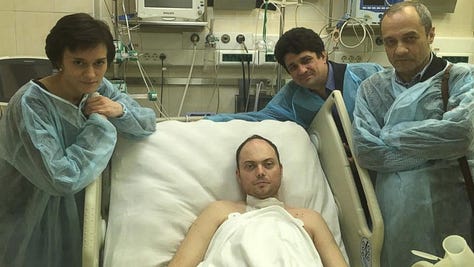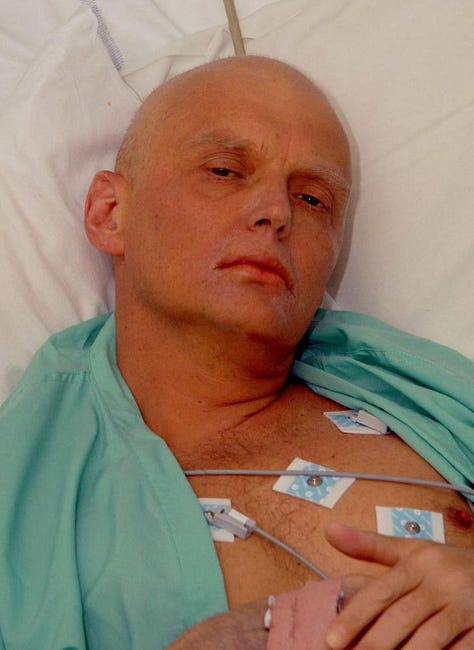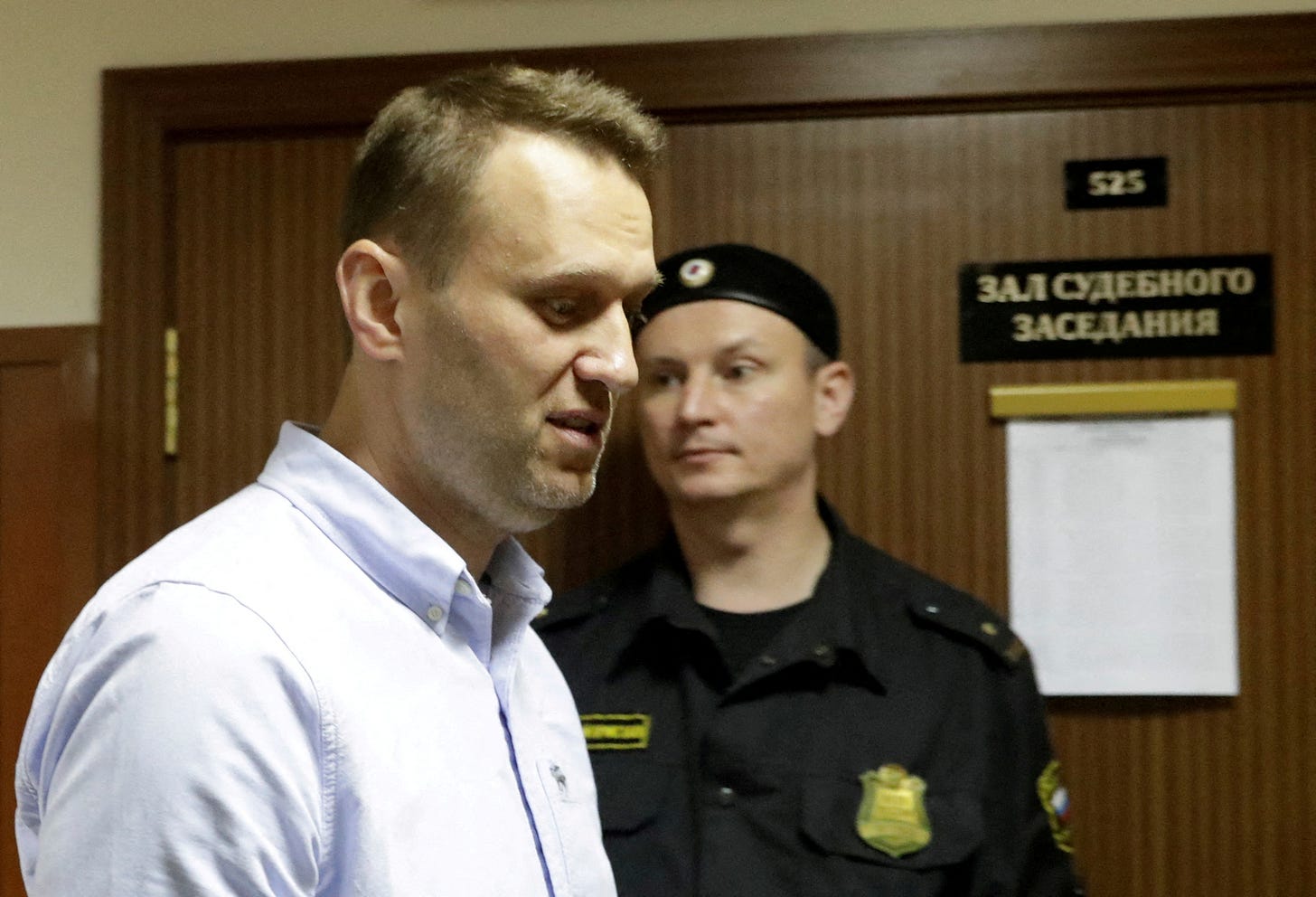Apr 25: Borogan & Soldatov, Putin Sends the Price of Opposition Skywards
As published in CEPA on April 18, 2023
Putin Sends the Price of Opposition Skywards
Irina Borogan & Andrei Soldatov, CEPA, April 18, 2023
Very little time passed after the assassination of a pro-Kremlin blogger before the FSB once again turned up the heat on political opponents.
Never ones to let an opportunity go to waste, the FSB leadership in the Lubyanka is now using the April 2 bombing of Vladlen Tatarsky to accuse leaders of the Navalny anti-corruption foundation — Leonid Volkov, and Ivan Zhdanov —of “inciting” the attack.
The group, hitherto known for exposing the gilded lifestyles of Vladimir Putin and his wealthy elite, is now accused of promoting “subversive activities in Russia, with the aim of changing the constitutional order of the Russian Federation, by any available means.” In short, the FSB is now branding the Navalny organization as a terrorist.
To many familiar with the Russian 20th-century history, the language used in the FSB statement sounds troublingly familiar. It is reminiscent of the demonology used by Andrei Vyshinsky, Stalin’s prosecutor at the notorious Moscow show trials, in the trial of the so-called Trotsky-Zinoviev center in 1936.
Vyshinsky accused the two men of the assassination of Sergei Kirov, the Leningrad Party Chief and a full member of the Politburo:
“The unification of these counter-revolutionary groups was achieved on the basis of the recognition as the main method of combating the Soviet power of individual terror against the leaders of the CPSU and the Soviet government . . . Not limiting themselves to the assassination of Kirov, the Trotskyist-Zinoviev center prepared a series of terrorist acts against comrades Stalin, Voroshilov, Zhdanov, L. M. Kaganovich, and Ordzhonikidze.”
Russia has been following this rhetorical path with ever-greater enthusiasm since launching the all-out invasion of Ukraine 14 months ago. But the use of language and policy straight from Stalinist textbooks is not new. It has been in preparation for a very long time.
The concept of the opposition as inherently terrorist has been entrenched in the security services and much of the legal system for years.

In Soviet times, political investigations were carried out by the infamous Fifth Directorate of the KGB, created in 1967 under KGB Chairman Yuri Andropov. The Fifth Directorate comprised 15 separate departments whose role was to quash dissent. The First Department was in charge of work through trade unions, the Second planned operations against émigré organizations critical of the Soviet Union, the Third worked among students, and so on. No fewer than 2,500 employees served in the Fifth Directorate. In the middle of Gorbachev’s perestroika era, in an effort to improve its image, the Fifth Directorate was renamed the Directorate to Defend the Soviet Constitutional System (Directorate Z). It did not survive the fall of the Soviet Union and was abolished in September 1991.
By July 1998, it was back. That was the same month that Putin became FSB director and the division was named the FSB’s Directorate to Protect the Constitution.
In an interview with Nezavisimaya Gazeta in November of that year, its chief, Gennady Zotov, described his Directorate’s role: “The state pursued the goal of creating a sub-unit ‘specialized’ in fighting threats to the security of the Russian Federation in the socio-political sphere . . . it has always devoted special attention to the protection of the country from ‘internal sedition,’ for internal sedition has always been more terrible for Russia than any military invasion.”
Zotov then did something very significant. He engineered a reverse takeover of the Antiterrorism Department, a move approved by Putin. Ever since the political police have existed within this powerful element of the FSB. In 2004, the department underwent another name change, this time becoming the Service to Protect the Constitutional System and Combat Terrorism, or the Second Service of the FSB, where the reference to the constitution is simply a euphemism for protecting the existing political regime.
For the FSB, this made absolute sense. Many FSB officers, deeply traumatized by the collapse of the Soviet Union, sincerely believed that the threat posed by terrorists and the threat posed by political dissent were on par and that their suppression was crucial for the country’s survival.
In 2006 this obsession with political stability was institutionalized through new counter-terrorism legislation.
This new law offered a striking definition of terrorism:
“Terrorism is an ideology of violence and influencing the decision-making of bodies [including] the government, institutions of local government, or international organizations, by means of intimidation of the population and (or) other forms of illegal violent action.”
That definition was new, emphasizing that terrorism was aimed at the state and its sub-units rather than at civilians, which was the earlier 1990s-era legal definition.



The FSB knew what they were doing – and ever since have gradually adopted their ruthless antiterrorist methods to political opponents. It was according to this logic that the use of lethal military-grade poisons, first used by the FSB against jihadi leaders in the North Caucasus, became a weapon of choice against Russian opposition leaders, including Alexei Navalny and Vladimir Kara-Murza (twice.) The Second Service of the FSB was heavily implicated in these attacks.
The Russian state has slowly raised the price of disagreement for its citizens. Now, as in the time of Stalin and his secret police chief, Lavrentiy Beria (“My Himmler”, as the Soviet leader called him), those with the courage to resist are asked to pay with their liberty or their lives.
Andrei Vyshinsky ended his 1936 court denunciation with the words: “I demand that the rabid dogs be shot — every single one!” And that is what they did.
Irina Borogan and Andrei Soldatov, both non-resident senior fellows at CEPA, are Russian investigative journalists, co-founders, and editors of Agentura.ru, which monitors Russian secret service activities. Both have covered Russian security services and terrorism for more than two decades.




